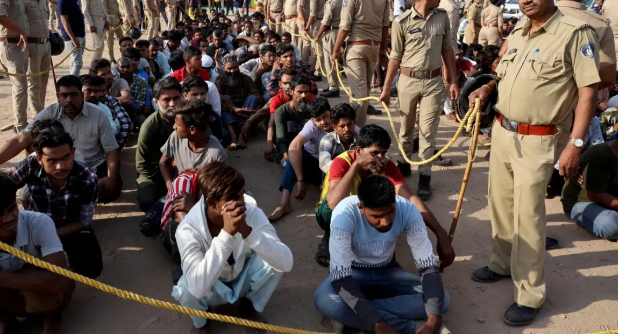Eastern and Western Nationalism: What Makes Them Different?
- Siddhant More

- Apr 17, 2025
- 4 min read
Any country in the post-modern global diaspora, in pursuit of establishing itself as a nation-state, must be a sovereign with a clear boundary and a system of governance. In this list, the most defining feature of a nation-state is its ability to identify the people who will make up its population. Who qualifies as a citizen of a nation-state often has specific universal markers. These include shared culture, values, beliefs, and history to create a sense of oneness and belonging. This appeal to belonging to a shared heritage is often the key behind the binding element of unison among the masses in a nation-state. These feelings of commonalities and fraternity are established and furthered by nationalism. Nationalism, by definition, stands for an ideology that emphasises loyalty, devotion, or allegiance to a nation or nation-state and holds that such obligations outweigh other individual or group interests. Although meant and centered around the citizens and their commonalities, it emphasises how the collective’s (nation-state’s) interests and protection are the primary aims of living in a nation-state.

Conceived during the French Revolution and then popularised worldwide, Nationalism as an ideology is often seen as a Western notion. Benedict Andersen, in his dissertation on Eastern and Western nationalism, claims that Eastern nationalistic movements are just as quickly mobilised and popularised as their Western counterparts. Benedict Andersen makes multiple claims in his dissertation to establish his thesis.
The author illustrates the historical and cultural complexities characterising national identities in the respective hemispheres. Contrary to popular belief, nationalistic elements are not always limited to geographical or racial boundaries.
Eastern and Western nationalism fundamentally differ in their contextualities and what they have emerged from. Western nationalism, since its conception during the French Revolution, has stood for ideals such as liberty, equality and fraternal feelings toward one another. These fraternal feelings stem from commonalities and shared history among the peoples of the nation-state. This also emphasised civic nationalism, pushing for democratic principles and individual rights. Here, shared culture and political institutions form the foundations of national identity.
In contrast, Eastern nationalism is majorly shaped by colonial legacies, which have fuelled the desire to establish a unique identity to resist cultural influence from the colonisers. Eastern nationalism bases its identity on regional and ethnic identities and historical grievances. The uniting forces here are based on historical grievances that have stemmed from the imperial set of these nations- emphasising the need for r a solid cultural identity that creates a bond strong enough to resist the se colonial forces.
Because Western nationalism stems from values, it often pushes for rational, legal-status-based political institutions that can establish and protect the rights and freedoms of individuals, collectives, and infrastructures. Western nationalism bases its appeal on rationality.
Eastern nationalism is arguably often created out of a sense of urgency - to combat the rising influence of the culture of the imperialist can be noted as a reactionary trait of the people of the state to want to protect their identity from cultural and political dilution. Eastern nationalism may intertwine with ethnoreligious components to further its pursuit, utilising historical narratives and instances which can often have an exclusionary appeal to the peoples, creating a very specific in-group and out-group (which may have violent outcomes), thereby creating a hurdle in establishing a cohesive national identity.
Nationalism as a Potential Catalyst for Violence:
When establishing a qualificatory citizen for a nation-state, markers such as language, ethnicity, culture, religion, and ideology are standard tools. Although this helps the nation-state develop a unique identity for its people, this qualificatory system needs to be more inclusive and create a group of outliers. In this situation, the nation-state ends up with an in-group and an out-group academically denoted as the ‘other’. Though both these groups include citizens of the same land, the latter’s legitimacy of the claim to the land is at stake.
Nationalism, when influenced by the context of the Sophist Enlightenment, can lead to military despotism. When collectivity over the individual, ethnic loyalty over rights and tradition over reason are highlighted as the basis for nationalism, it leads to an illiberal connotation, creating National Socialism, which always possesses the power to influence the threat of violence - an enemy of the state also becomes an enemy of the self.
Nationalism’s mass appeal is in its ability to instil an intense loyalty toward the nation-state and fellow members of the in-group - nationalism can be taken to extremes where conflicts over identity, territory, and resources can quickly come forth. Nationalism can galvanise feelings and situations that justify aggression to dehumanise the ‘other’ to asser the in-group’s claims and achieve a sense of self-determination. This often perpetuates cycles of retaliation and hostility.
Wars can result from having too many or too few nation-states. When there are too many states, there will be wars for national unification; when there are too few states, there will be wars for secession—both fuelled by nationalism. At its most authentic, nationalism sets out to be liberal and inclusive, preventing conflict and promoting inclusivity. However, certain conditions must often exist for nationalism to play the role of a catalyst to perpetuate violence.
Nationalism poses the most significant threat of violence when its people are stateless. The balance of power between the nationalism and the states that hold these individuals - stateless nationalisms where statehood is not attained and cannot be as well will remain dormant; nationalism which has already established as a state also poses little threat; however, there exists a danger of violence when statehood is achieved but has not been attained yet. The more hegemonistic the goals of nation-states are, the greater the chances for conflict and violence. Most nationalities and their people may be absent within the exact boundaries, which asks the question—what must the nation do to incorporate its whole nationality? Will it be by bringing the diaspora to the country (immigration) or by getting the country to the diaspora (expansionism)? The Zionist national struggle perfectly exemplifies the intersectionality of the conditions above and the claim of ‘historic right’being exploited to justify any kind of injustice. Zionism’s freedom struggle damaged the interests of another group when it displaced Arabs in 1948 - sowing the seeds for the Arab-Israeli conflict we witness today.
References -
Kohn, H. (n.d.). Inventing the opposition of ethnic and civic nationalism.
Anderson, B. (2001). Western Nationalism and Eastern Nationalism. New Left Review, 31–34.
van Evera, S. (1994). Hypotheses on Nationalism and War, Vol 18, No.. The MIT Press, 5-39













Comments